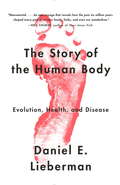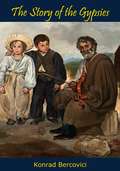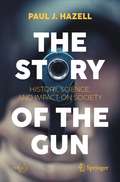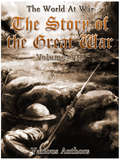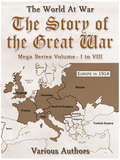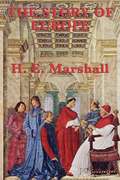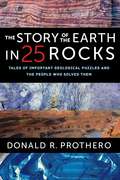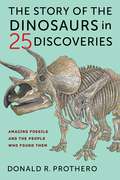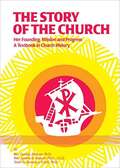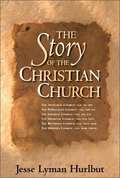- Table View
- List View
The Story of the Human Body
by Daniel LiebermanIn this landmark book of popular science, Daniel E. Lieberman--chair of the department of human evolutionary biology at Harvard University and a leader in the field--gives us a lucid and engaging account of how the human body evolved over millions of years, even as it shows how the increasing disparity between the jumble of adaptations in our Stone Age bodies and advancements in the modern world is occasioning this paradox: greater longevity but increased chronic disease. The Story of the Human Body brilliantly illuminates as never before the major transformations that contributed key adaptations to the body: the rise of bipedalism; the shift to a non-fruit-based diet; the advent of hunting and gathering, leading to our superlative endurance athleticism; the development of a very large brain; and the incipience of cultural proficiencies. Lieberman also elucidates how cultural evolution differs from biological evolution, and how our bodies were further transformed during the Agricultural and Industrial Revolutions. While these ongoing changes have brought about many benefits, they have also created conditions to which our bodies are not entirely adapted, Lieberman argues, resulting in the growing incidence of obesity and new but avoidable diseases, such as type 2 diabetes. Lieberman proposes that many of these chronic illnesses persist and in some cases are intensifying because of "dysevolution," a pernicious dynamic whereby only the symptoms rather than the causes of these maladies are treated. And finally--provocatively--he advocates the use of evolutionary information to help nudge, push, and sometimes even compel us to create a more salubrious environment. (With charts and line drawings throughout.)
The Story of the Human Body
by Daniel LiebermanIn this landmark book of popular science, Daniel E. Lieberman--chair of the department of human evolutionary biology at Harvard University and a leader in the field--gives us a lucid and engaging account of how the human body evolved over millions of years, even as it shows how the increasing disparity between the jumble of adaptations in our Stone Age bodies and advancements in the modern world is occasioning this paradox: greater longevity but increased chronic disease. The Story of the Human Body brilliantly illuminates as never before the major transformations that contributed key adaptations to the body: the rise of bipedalism; the shift to a non-fruit-based diet; the advent of hunting and gathering, leading to our superlative endurance athleticism; the development of a very large brain; and the incipience of cultural proficiencies. Lieberman also elucidates how cultural evolution differs from biological evolution, and how our bodies were further transformed during the Agricultural and Industrial Revolutions. While these ongoing changes have brought about many benefits, they have also created conditions to which our bodies are not entirely adapted, Lieberman argues, resulting in the growing incidence of obesity and new but avoidable diseases, such as type 2 diabetes. Lieberman proposes that many of these chronic illnesses persist and in some cases are intensifying because of "dysevolution," a pernicious dynamic whereby only the symptoms rather than the causes of these maladies are treated. And finally--provocatively--he advocates the use of evolutionary information to help nudge, push, and sometimes even compel us to create a more salubrious environment. (With charts and line drawings throughout.)
The Story of the Haymarket Riot (Cornerstones of Freedom)
by Charnan SimonTraces the efforts of industrial workers to secure better working conditions, including the eight-hour day and how deteriorating relations between striking workers and police led to the Haymarket Square Riot which resulted in the unfair convictions of eight social revolutionaries in a murder-conspiracy trial.
The Story of the Gypsies
by Konrad BercoviciWith this book, first published in 1928, Romanian-born American author Konrad Bercovici has written a sympathetic, thorough, and fascinating account of an extra-ordinary people. Long an admirer of the Gypsies, he was determined to penetrate their mysteries. He listened to their legends, traced their history, and here presents all that he knows and could learn from others about their origins, customs and lives down through the centuries and throughout the world.
The Story of the Gun: History, Science, and Impact on Society (Springer Praxis Books)
by Paul J. HazellThis engaging and accessible book explains the scientific principles behind guns, both ancient and modern. It connects their evolution to advances in science, as well as tracing the developments of projectiles and propellants. It is not limited to small arms but also looks at the science of enormous guns such the Paris Gun, for example, and reviews the efforts to build a gun to launch projectiles into space. Extremely fast guns are also covered, such as two-stage guns and rail guns. Further, the book provides insight into the science of terminal ballistics and wound ballistics as well as the challenging subject of gun control. It is full of interesting facts for all who are curious about the science and history of guns, as well as those for whom the gun is an accessory of their profession.
The Story of the Guards Armoured Division
by The Earl of Rosse E. R. HillFormed in June 1941, the Guards Armoured Division proved that Household Troops could adapt their legendary high standards to a totally new role. Deploying to Normandy in 1944 under Major General Sir Allan Adair, the Division acquitted itself with distinction in the costly Operation GOODWOOD.After the breakout, the Welsh Guards liberated Brussels on 3 September and the Division played a leading role in Operation MARKET GARDEN.In early 1945, the Division fought in Operation VERITABLE, breaking General Schlemms lateral line near Menzelen. The Rhine crossing followed, with the Guards Armoured leading XXX Corps towards Bremen and Hamburg. Guardsman Edward Charlton, Irish Guards, severely wounded, broke up a counterattack and earned the last VC of the European war.The Story of The Guards Armoured Division is a classic account of the Divisions superb fighting record.
The Story of the Green Mountain Boys (Cornerstones of Freedom)
by Susan ClintonDiscusses the activities of the Green Mountain Boys under the leadership of Ethan Allen, first working as a private part-time army to defend land ownership rights in the colony which later became Vermont.
The Story of the Great War, Volume 8 of 8 (The World At War)
by VariousThis is volume eight of eight and it concerns itself mainly with the victory of the Allied Forces, the Armistice, and the Peace Conference at Paris. A lesser known, but important part covers Canada's war organisations and vast war industries plus the Canadian battles overseas.
The Story of the Great War, Mega Series Volume I to VIII (The World At War)
by VariousThe First World War is one of history's greatest tragedies. This remarkable and intimate collection of reports and notes from active participants bring to life the story of how the Great War reduced Europe's mightiest empires to rubble, killed twenty million people, and cracked the foundations of the world we live in today. This ebook contains all Volumes from I to VIII, available also as individual downloads. The Mega Series is available for a special price and the first volume comes free.
The Story of the Great Society (Cornerstones of Freedom)
by Leila Merrell FosterDescribes the social reform work done by President Johnson and the significant legislative accomplishments through which he hoped to help blacks and the poor of America.
The Story of the Great Depression
by R. Conrad SteinDiscusses the causes, conditions, and events of the Great Depression and highlights the programs initiated to revitalize the national economy.
The Story of the Grail and the Passing of Arthur
by Howard PyleGenerations of children have thrilled to Howard Pyle's skillful retelling of the legends of King Arthur and the Knights of the Round Table. This book is one of the best of the series — a rich chronicle that includes the stirring adventures of Sir Galahad and the pursuit of the Holy Grail as well as the last chapter in the life of King Arthur.The book begins with the exciting story of Sir Geraint — how he fought with the knights of the Sparrow-Hawk, how he set right the wrongs of the earldom, how he destroyed three giants of the highway and more. The narrative then takes up the thrilling exploits of Sir Galahad ("the most perfect knight who ever lived"): his initiation into knighthood, how he came to the court of King Arthur and his quest for the Holy Grail. Finally, there are the last chapters in the life of King Arthur — his attack on Sir Lancelot, his fatal battle with Sir Mordred and Arthur's final journey to Avalon.Recounted in language appropriately medieval in flavor and enhanced with 39 of Howard Pyle's richly atmospheric illustrations, these tales promise a splendid reading experience — a magical journey to a far-off time and a bygone world of knightly valor and chivalric romance.
The Story of the Gold at Sutter's Mill (Cornerstones of Freedom)
by R. Conrad SteinPresents the scene in California after gold was discovered on John Sutter's land in 1849 and the subsequent fortunes made and hearts broken.
The Story of the First Americans (Ancient Times #Book One)
by Suzanne Strauss ArtThis is the first of two volumes about Native Americans written for students in grades five through eight. <P><P> It begins with the first bands of nomads who crossed the land bridge from Asia during the last Ice Age and proceeds to describe how their descendants learned to adapt to a wide variety of natural environments. <P><P>Each of the six chapters focuses upon a particular geographical region and traces the better known cultures that evolved there from earliest times until about the 12th century AD.
The Story of the Fens
by Frank MeeresLincolnshire, Cambridgeshire, Norfolk and Suffolk, as well as Peterborough City Council, all lay claim to a part of the Fens. Since Roman times, man has increased the land mass in this area by one third of the size. It is the largest plain in the British Isles, covering an area of nearly three-quarters of a million acres and is unique to the UK. The fen people know the area as marsh (land reclaimed from the sea) and fen (land drained from flooding rivers running from the uplands). The Fens are unique in having more miles of navigable waterways than anywhere else in the UK. Mammoth drainage schemes in the seventeenth and eighteenth changed the landscape forever – leading slowly but surely to the area so loved today. Insightful, entertaining and full of rich incident, here is the fascinating story of the Fens.
The Story of the Europe
by H. E. MarshallIn The Story of Europe, H. E. Marshall begins the tale of the history of Europe starting around 100 B.C. She covers nearly 1500 years, ending around 1600 A.D. The History starts will the fall of the Roman Empire, laying the groundwork for the years to come, and ends with the Reformation. She tells it in a fashion that children are able to understand, and that will keep them interested.
The Story of the Empire State Building (Cornerstones of Freedom)
by Patrick ClintonDescribes the planning and building of what was once the world's tallest building and examines how it fit into the growth of New York City.
The Story of the Election of Abraham Lincoln (Cornerstones of Freedom)
by Zachary KentFollows Abraham Lincoln's political career from his senatorial campaigning in Illinois to his early actions as president, discussing his political opponents and the state of the American government at that time.
The Story of the Earth in 25 Rocks: Tales of Important Geological Puzzles and the People Who Solved Them
by Donald R. ProtheroEvery rock is a tangible trace of the earth’s past. The Story of the Earth in 25 Rocks tells the fascinating stories behind the discoveries that shook the foundations of geology. In twenty-five chapters—each about a particular rock, outcrop, or geologic phenomenon—Donald R. Prothero recounts the scientific detective work that shaped our understanding of geology, from the unearthing of exemplary specimens to tectonic shifts in how we view the inner workings of our planet. Prothero follows in the footsteps of the scientists who asked—and answered—geology’s biggest questions: How do we know how old the earth is? What happened to the supercontinent Pangea? How did ocean rocks end up at the top of Mount Everest? What can we learn about our planet from meteorites and moon rocks? He answers these questions through expertly chosen case studies, such as Pliny the Younger’s firsthand account of the eruption of Vesuvius; the granite outcrops that led a Scottish scientist to theorize that the landscapes he witnessed were far older than Noah’s Flood; the salt and gypsum deposits under the Mediterranean Sea that indicate that it was once a desert; and how trying to date the age of meteorites revealed the dangers of lead poisoning. Each of these breakthroughs filled in a piece of the greater puzzle that is the earth, with scientific discoveries dovetailing with each other to offer an increasingly coherent image of the geologic past. Summarizing a wealth of information in an entertaining, approachable style, The Story of the Earth in 25 Rocks is essential reading for the armchair geologist, the rock hound, and all who are curious about the earth beneath their feet.
The Story of the Dinosaurs in 25 Discoveries: Amazing Fossils and the People Who Found Them
by Donald R. ProtheroToday, any kid can rattle off the names of dozens of dinosaurs. But it took centuries of scientific effort—and a lot of luck—to discover and establish the diversity of dinosaur species we now know. How did we learn that Triceratops had three horns? Why don’t many paleontologists consider Brontosaurus a valid species? What convinced scientists that modern birds are relatives of ancient Velociraptor?In The Story of the Dinosaurs in 25 Discoveries, Donald R. Prothero tells the fascinating stories behind the most important fossil finds and the intrepid researchers who unearthed them. In twenty-five vivid vignettes, he weaves together dramatic tales of dinosaur discoveries with what modern science now knows about the species to which they belong. Prothero takes us from eighteenth-century sightings of colossal bones taken for biblical giants through recent discoveries of enormous predators even larger than Tyrannosaurus. He recounts the escapades of the larger-than-life personalities who made modern paleontology, including scientific rivalries like the nineteenth-century “Bone Wars.” Prothero also details how to draw the boundaries between species and explores debates such as whether dinosaurs had feathers, explaining the findings that settled them or keep them going. Throughout, he offers a clear and rigorous look at what paleontologists consider sound interpretation of evidence. An essential read for any dinosaur lover, this book teaches us to see an ancient world ruled by giant majestic creatures anew.
The Story of the Diamond: Timeless. Elegant. Iconic.
by Tamara Sturtz-FilbyA symbol of power, a promise of marriage and a girl's best friend, the diamond is unmatched by any other gemstone in the world. From ancient civilizations and the royal courts of Europe to modern culture, film and fashion, the mystique and glamour of the world's most brilliant natural treasure is told in a story that merges history with gemology, collecting with couture. Celebrating our everlasting fascination with this prized jewel, The Story of the Diamond gives background on merchants, traders and jewellers, from Cartier to Harry Winston, as well as legendary and rare stones, such as the cursed Hope, the stolen Koh-i-Noor and the ransomed Idol's Eye.With indepth information on styles, cuts, colours and carats, and both natural and lab-grown stones, as well as a chapter devoted to engagement rings, there is advice on selecting and buying sustainably sourced diamonds.
The Story of the Country House: A History of Places and People
by Clive AsletThe fascinating story of the evolution of the country house in Britain, from its Roman precursors to the presentThe Story of the Country House is an authoritative and vivid account of the British country house, exploring how they have evolved with the changing political and economic landscape. Clive Aslet reveals the captivating stories behind individual houses, their architects, and occupants, and paints a vivid picture of the wider context in which the country house in Britain flourished and subsequently fell into decline before enjoying a renaissance in the twenty-first century. The genesis, style, and purpose of architectural masterpieces such as Hardwick Hall, Hatfield House, and Chatsworth are explored, alongside the numerous country houses lost to war and economic decline. We also meet a cavalcade of characters, owners with all their dynastic obsessions and diverse sources of wealth, and architects such as Inigo Jones, Sir John Vanbrugh, Robert Adam, Sir John Soane and A.W.N. Pugin, who dazzled or in some cases outraged their contemporaries. The Story of the Country House takes a fresh look at this enduringly popular building type, exploring why it continues to hold such fascination for us today.
The Story of the Clipper Ships (Cornerstones of Freedom)
by R. Conrad SteinDiscusses the design, uses, sailing, and decline of clipper ships that enjoyed a short but glorious reign of the seas during the mid-1800s.
The Story of the Church
by George Johnson Jerome Hannan M. DominicaTo know and to understand the Church is a sacred duty for every Catholic. The Church is not just an organization to which we belong; it is an organization of which we are a part. Loyalty to the Church is not merely one among many loyalties. It is the one great loyalty of our lives in which all other loyalties are rooted and from which all derive their life and strength. <p><p>For the Church is Christ and in the Church we are united with Him and with one another as members of one Body. Hence, a burning love for the Church must always be an outstanding characteristic of a good Catholic. <p><p> THE STORY OF THE CHURCH has been written for boys and girls with the hope that, as they learn from the story that it tells, their love of Christ in His Church will increase and that a lifelong interest in Church History will be enkindled. As much as possible we have tried to weave our story around the great men and women who in every age have labored heroically for the spread of the Kingdom of Christ and who have won for themselves the most glorious title that can be given to a human being, the title of Saint. Christ lived in them and through them revealed to the world the power and the beauty of His Gospel. (From the Author s Preface.)
The Story of the Christian Church
by Jesse Lyman HurlbutNo institution has spanned more centuries and more continents than the Christian church. Its dramatic story is one of bloodshed and peace, corruption and purity. Here Dr. Hurlbut retells this story in an objective, concise, and clear style, emphasizing the spirit of the church, its growth and maturation, and the causes leading to historic events and their resulting influence. Accurate, up-to-date, and vividly presented, Hurlbut's Story of the Christian Church traces the six general periods of church history from A. D. 30 to the present day. A concluding section, covering the period since Dr. Hurlbut's death, has been added in this revised edition, thus giving the reader a complete, easily understood overview of the Christian church. Designed for two audiences, this book contains outlines and references in the margins to aid the student or teacher along with a continuous narrative and numerous illustrations for the general reader. It is ideal for Sunday school use, since it includes suggested outlines and review questions for each chapter at the end of the book.
